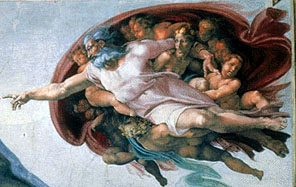
The Creation of Adam
(1508-1512) on the ceiling of the Sistine Chapel has long been recognized as one of the
world's great art treasures. In 1990 Frank Lynn Meshberger, M.D. described what millions
had overlooked for centuries - an anatomically accurate image of the human brain was
portrayed behind God. On close examination, borders in the painting correlate with sulci
in the inner and outer surface of the brain, the brain stem, the basilar artery, the
pituitary gland and the optic chiasm. God's hand does not touch Adam, yet Adam is already
alive as if the spark of life is being transmitted across a synaptic cleft.* Below the
right arm of God is a sad angel in an area of the brain that is sometimes activated on PET
scans when someone experiences a sad thought. God is superimposed over the limbic system,
the emotional center of the brain and possibly the anatomical counterpart of the human
soul. God's right arm extends to the prefrontal cortex, the most creative and most
uniquely human region of the brain.
*Frank Lynn Meshberger, M.D.,
The Interpretation of Michalangelo's Creation of Adam Basilar Neuroanatomy, JAMA #14
October 1990 |